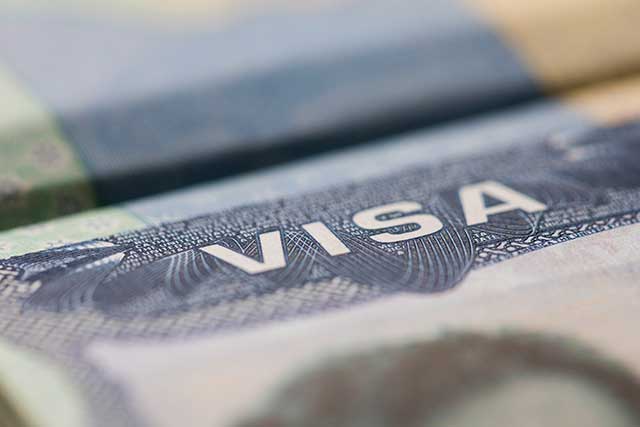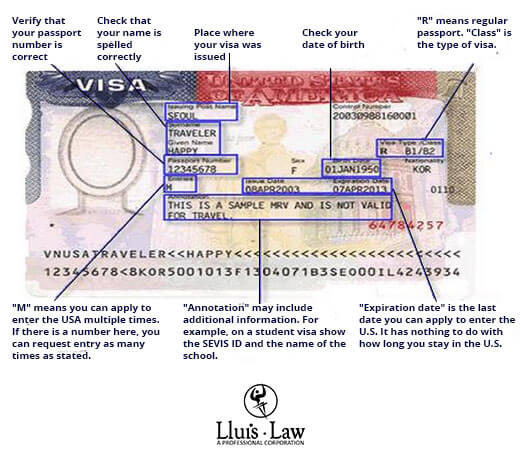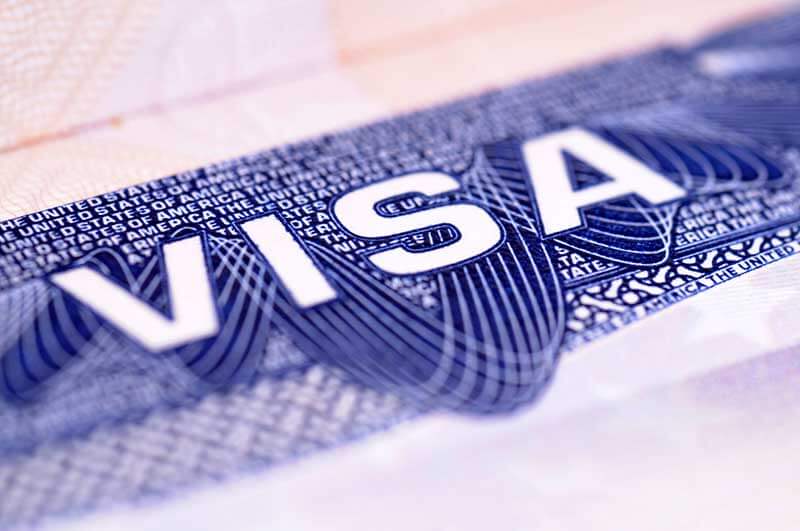There are various types of American visas available for those who wish to reside in the United States or visit it temporarily.
Depending on your needs, you can apply for a work, study, tourist visa and so on.
In this regard, it is crucial to have the advice of our immigration lawyers in Los Angeles to avoid setbacks in the processing.
LATINOS WITH OVER 50 YEARS EXPERIENCE
Tell Us Your Case
Table of Contents
Main Categories And Types Of American Visas In 2025
So, what are the types of visas that exist? Let’s take a look at the most popular sorted by categories and purpose of travel:
Tourist And Business Visas

In this category, there are 2 types of American non-immigrant visas, which are:
- B-1 business visa: For professional activities such as meetings with partners or negotiating contracts.
- B-2 tourist visa for the United States: For tourism, shopping, family visits, or medical treatment:
Note: If you would like more information about a specific visa, you will see that we have linked you to the respective blogs with detailed information about the visa you are interested in.
Temporary Worker Visas

Temporary work visas in the US allow foreigners to work for a limited time and cover several categories:
- E-3 visa: Australians working in specialized areas.
- H-1B visa: Foreign workers in specialty occupations.
- H-1B1 Visa: Free Trade Agreement (FTA) professionals from Chile and FTA professionals from Singapore.
- H-2A Visa: Temporary agricultural workers;
- H-2B visa: Temporary non-agricultural workers.
- H-3 visa: Special education trainees or visitors.
- L-1 visas: For transfers within a company (L-1A for executives and L-1B for experts).
- O-1 visa: Aliens of extraordinary ability in the arts, sciences, education, business, or athletics.
- Q visa: Visitors in cultural exchange programs between the US and other countries.
- P visa: For athletes and artists. This includes visa subtypes from P-1 to P-3.
- Religious type R visa: For religious workers.
- I visa: For journalists and foreign media.
- TN Visa: For North American Free Trade Agreement (NAFTA now USMCA) Temporary Professionals.
Permanent Worker Visas

In this category the types of American visas for immigrants through employment are named. This means that immigrants can get a Green Card through a job in the US.
- EB-1 visa: For aliens with extraordinary abilities, distinguished professors, and transferred executives.
- EB-2 visa: For professionals with advanced degrees or exceptional abilities.
- EB-3 visa: For professionals or specialized workers.
- EB-4 visa: Certain special immigrants.
- EB-5 visa: For immigrant Investors.
Students and Exchange Visitor Visas

Depending on the field of study and the center, you can get one of the following student visas for the United States:
- F-1 visa: International students enrolled in an academic study program in the US.
- F-2 visa: Dependents of the F-1 holder (spouse and children).
- F-3 visa: Mexican or Canadian academic students who have to move periodically (Commuter).
- M-1 visa: Foreign students enrolled in a vocational program.
- M-2 visa: Dependents of the M-2 holder (spouses and children).
- M-3 visa: Mexican or Canadian commuter vocational students.
- J-1 visa: Aliens in study or work exchange programs.
- J-2 visa: Dependents of J-1 visa holders.
Family Visas

There are several options for American citizens and lawful permanent residents to reunite with their families:
- V visas: Allows families to stay together while waiting for the processing and approval of an immigrant visa.
- Visas for spouses of American citizens: IR-1 and CR-1 visas are intended for spouses depending on the length of the marriage. There is also an IR-2 visa for eligible children.
- Fiancé(e) visas: The K-1 fiancé(e) visa allows fiancés of American citizens to be brought to the US. The K-3 and K-4 visas are similar but for spouses and their children.
- Visas for certain relatives of US citizens: These range from F1 to F3 and include unmarried and married children and siblings of the American citizen.
- Visas for Family Members of Lawful Permanent Residents: Includes F2A for spouses and minor children and F2B for unmarried children of legal age.
- Orphan Child Adoption visas: These include IR-3, IR-4, IH-3, and IH-4 depending on the place of adoption.
Transit And Crew Member visas

As a general rule, all aliens who wish to transit through the US need a visa, even if they are stopping in the country.
- US transit C visa: Allows transit through the United States to another international destination.
- Crewmember D visa: It is a crew visa for those who work on board commercial and international aircraft or vessels.
Note: There is a special visa called a Border Crossing Card (BCC) that acts like a B-1/B-2 visa. However, this visa is only issued to Mexican citizens and residents.
Visas For Diplomats Or Foreign Government Officials

These visas may be issued to diplomats and other government officials for official or transit travel to the US. The type of visa you need is often determined by the purpose of your trip.
- Diplomatic A type visa: It is for officials and diplomats of a foreign government. It includes the following two subcategories:
- A-1 Visa: Diplomats or foreign government officials traveling to the US on official business.
- A-2 visa : Mid-ranking military officials working full-time at an embassy or consulate in the US. Includes civilian diplomatic officials and their immediate family members.
- G Visa: Employees of designated international organizations and NATO. Includes the following visas:
- G-1: Members of the permanent mission of a recognized government to a designated international organization. It also includes your immediate family members;
- G-2: Representatives of a recognized foreign government traveling temporarily to the US to attend meetings of an international organization. It also includes their direct relatives.
- G-3: Government representatives or unrecognized members and their immediate family members;
- G-4: Aliens traveling to the US to take up a position with a designated international organization. Includes your immediate family members.
- G-5: Personal employees or domestic workers of G-1 through G-4 visa holders.
Note: These visas include immediate relatives, with the exception of G-5.
Visas For Victims Of Crimes, Violence And Abuse

Those aliens who have been victims of abuse or certain crimes, may be eligible for the following visas:
- T visa: Victims of human trafficking.
- U visa: Victims of criminal acts.
- VAWA visa : Victims of abuse or extreme cruelty.
Our attorneys are not only immigration specialists, they are also expert criminal lawyers in Los Angeles.
Other Types Of Visas In The United States

There are other types of visas that are almost an independent category in themselves. Here are some of the most popular:
- Special Immigrant Juvenile Status: Protection for minor victims of abuse, neglect, or abandonment.
- Diversity visas: For immigrants who come from countries with a low rate of immigration to the US.
- SB-1 visa: For permanent residents who, for reasons beyond their control, have been out of the country for more than a year or their re-entry permit is no longer valid. This visa grants them entry to the United States again.
- S visas: For informants and witnesses of criminal or terrorist activities who assist US law enforcement authorities.
Didn’t find the visa you were looking for? Don’t worry. We’ve only included the most important ones here. Whatever visa you need assistance with, don’t hesitate to contact us.
How can a visa be used to enter the United States?
With a US visa, you can travel to a port of entry, airport, or land border crossing in the United States. Once there, you can apply for permission to enter the country.
However, upon arrival, an inspector from the Department of Homeland Security (DHS) and Customs and Border Protection (CBP) will review your visa and determine whether:
- Meets the entry requirements; and
- The length of time and status under which you may remain in the U.S.
Please note that having a visa does not guarantee you entry, but indicates that a consular officer has assessed your eligibility to apply for a specific purpose.
What types of American visas do I need to go to the United States?

The type of visa you need to travel to the United States depends on the purpose of your visit. Visas are divided into two main categories:
- Nonimmigrant visas: These visas are temporary, so you will generally have to leave the US at the end of your term.
- Immigrant visas: These types of visas are focused on those who wish to settle and live permanently in the US.
Now you know how many types of visas there are for the United States and how to choose the one that suits your travel purpose. However, choosing the right visa and meeting all the requirements can be a complex process.
Call our Los Angeles immigration attorneys at Lluis Law for personalized advice and to ensure the success of your application.
What is the general process for applying for an American visa?
The process for applying for an American visa generally follows these steps:
- Determine eligibility: The first step is to check if you meet the requirements for the visa you wish to apply for.
- Completing the Application: You must complete the online application, which varies depending on the type of visa (for example, Form DS-160 for nonimmigrant visas).
- Paying fees: In most cases, you will need to pay an application fee which may vary depending on the type of visa.
- Schedule an appointment: Once your application is complete, you will need to schedule an appointment for an interview at the appropriate US embassy or consulate.
- Attend the interview: The next step is to attend the interview, where a consular officer will review your application and ask you questions to determine your eligibility for the visa.
- Waiting for approval: If your visa is approved, you will be told when and how to pick up your passport with the stamped visa.
How long does it take to process the different types of American visas?
The processing time for a US visa varies depending on the type of visa and the embassy or consulate where you apply.
Currently, due to high demand, wait times for a visa appointment can be significant.
However, you may find shorter wait times at different embassies or consulates. We recommend checking the USCIS wait times webpage for up-to-date information on the timeframes for these visas.
What is the priority date for American visa types?
The priority date is the time when the application for a Green Card is processed according to the applicant’s country of origin and visa category.
Simply put, it is the date that USCIS receives the application. This date determines the applicant’s place in the visa queue.
Applications with earlier priority dates are processed first. If a person’s priority date falls before the deadline indicated in the visa bulletin, the application may move forward.
Lawyers in Los Angeles for different types of American visas
With over 50 years of combined experience in immigration law, our attorneys are recognized and respected for having helped hundreds of immigrants process various US visas.
If you have questions about your visa or need legal assistance to process it, do not hesitate to contact us.
Having specialized immigration attorneys by your side is the first step to achieving your goals in the US.
LATINOS WITH OVER 50 YEARS EXPERIENCE
Tell Us Your Case




